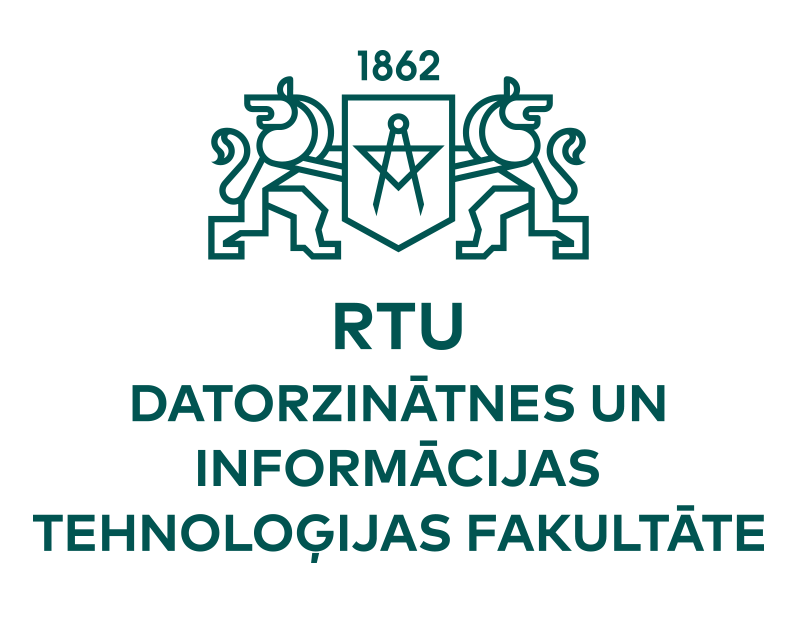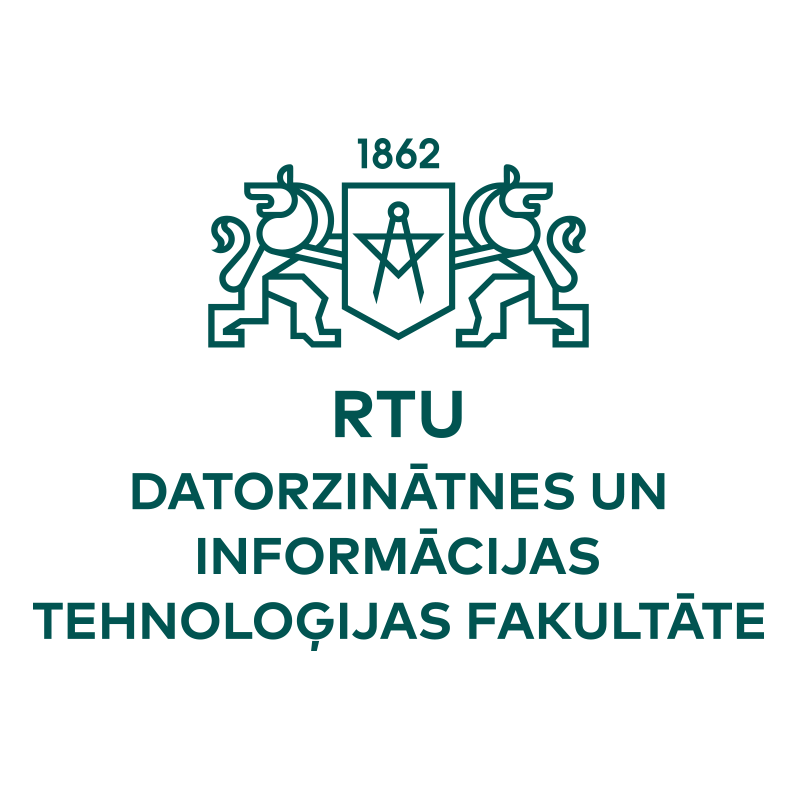Riga Technical University Information Technology Institute (ITI) is a research and higher education institution with a mission of knowledge and technology transfer to industry in the area of information technology. ITI emphasizes a cross-disciplinary approach with applications in software services, transportation, logistics, and urban development. The ITI is non-profit institution with a mission to help companies and organization to solve complex digitalization problems and to facilitate knowledge and technology transfer to businesses and society.
The main areas of specialization are enterprise integration including advanced enterprise applications and business process improvement, development of scalable cloud solutions for big data processing, data mining and machine learning including applications in cybersecurity, IoT, intelligent transportation systems and biotechnology, modelling and optimization of complex systems, development of digital twins as well as digital transformation of organization by using advanced information technologies.
ITI provides companies with cloud-hosted test and development environments for prototyping and implementing advanced ICT solutions. Several Enterprise Resource Planning systems are available to investigate business process improvement possibilities and application integration. Cloud computing infrastructure is available to develop horizontally scalable systems and to implement computationally demanding analytical solutions. ITI’s proprietary horizontally scalable real-time data processing platform BaSeCaaS and capability-driven development methodology are provided for implementing custom context-aware and adaptive real-time big data publishing and processing services according to Kappa and Lambda architecture. HPC equipment is provided for training machine learning models and performing resource intensive simulations. A simulation modelling and digital twin development platform is available for creating models of complex systems and conducting experiments.
ITI organizes events for promoting knowledge and technology transfer to SME including industry days and a conference on digitalization at SME in cooperation with the Latvian Ministry of Environmental Protection and Regional Development, which is responsible for digitalization in Latvia (http://iti.rtu.lv/en/research/projects/confrerence-promoting-digitalization-and-innovation-small-and-medium-sized).
ITI DIH is a contact point for I4MS

ITI DIH is implementing a project Change2Twin

Link to national or regional initiatives for digitising industry
RTU ITI participates in development of Latvian Digital Transformation Guidelines for 2021-2027. The guidelines call for the rapid advancement of digitalization in the Latvian industry. The main development directions are digital skills, cybersecurity, availability of high-performance computing, digital transformation of businesses, and digital innovation. ITI directly contributes to all directions and is fully aligned with national initiatives. ITI organizes events for promoting knowledge and technology transfer to SME including industry days and a conference on digitalization at SME in cooperation with the Latvian Ministry of Environmental Protection and Regional Development, which is responsible for digitalization in Latvia (http://iti.rtu.lv/en/research/projects/confrerence-promoting-digitalization-and-innovation-small-and-medium-sized). The conference worked together with SME to identify digitalization opportunities and challenges. It is a part of the series of events devoted to digitalization in Latvia (https://mana.latvija.lv/).
On the national scale, ITI works together with IT Competence Centre co-financed by European Regional Development Fund and aiming to promote long-term cooperation between ICT enterprises and research institutions. ITI has provided R&D services and access to its computing equipment and specialized software withing six projects as a part of this collaboration:
-
“Analytical data warehouse framework design for e-government.” (http://iti.rtu.lv/en/research/projects/itkc-project-analytical-data-warehouse-framework-design-e-government);
-
“The Method of Monolithic System Decomposition According to SOA Principles” (http://iti.rtu.lv/en/research/projects/method-monolithic-system-decomposition-according-soa-principles);
-
“Development of Software Adaptation Algorithms and Module Based on Context Information Extracted from Users Action Logs” (http://iti.rtu.lv/en/research/projects/development-software-adaptation-algorithms-and-module-based-context-information);
-
“Support for multi-criteria enterprise vehicle routing” (http://iti.rtu.lv/en/research/projects/support-multi-criteria-enterprise-vehicle-routing);
-
"Resource-saving computational optimization solutions" (http://iti.rtu.lv/en/research/projects/itkc-project-resource-saving-computational-optimization-solutions)
-
“Scalability method for adaptive cloud computing platform corresponding to set of congurable parameters”
(http://iti.rtu.lv/en/research/projects/itkc-project-scalability-method-adaptive-cloud-computing-platform-corresponding)
ITI provides R&D services and access to its specialized computing equipment and software for its partnering SME’s within the ERD and nationally funded program “Support for applied research” as part of the following projects:
-
“Development of Intelligent Electricity Management Systems Adapted for Residential Buildings and Equipment to be integrated into them for efcient use of grid connection and ensuring the availability of new services – INREBEMD” (http://iti.rtu.lv/en/research/projects/development-intelligent-electricity-management-systems-adapted-residential)
-
“IWiRoM: Development of a new type of Intelligent Winter Road Maintenance information system and ERP integration solution for improving efciency of maintenance processes” (http://iti.rtu.lv/en/research/projects/iwirom-development-new-type-intelligent-winter-road-maintenance-information)
-
“Development of big-data-driven information and communication technology security management solution (BICTSEMS)” (http://iti.rtu.lv/en/research/projects/development-big-data-driven-information-and-communication-technology-security)
Market and Services
ITI participates in the European FLAG-ERA initiative project FUTURICT 2.0 with the goal to nd ways to understand and manage complex, global, socially interactive systems.
Market sectors
- Transport, storage and communication
- Manufacture of food products, beverages and tobacco
- Manufacture of wood and wood products
- Manufacture of machinery and equipment
TRL Focus
- TRL3 - Analytical and experimental critical function and/or characteristic proof of concept
- TRL4 - Component and/or breadboard validation in laboratory environment
- TRL6 - System/subsystem model or prototype demonstration in a relevant environment
- TRL7 - System prototype demonstration in an operational environment
Services provided
- Collaborative Researchs
- Concept validation and prototyping
- Testing and validation
- Education and skills development
Service Examples
Adaptive enterprise application
Client profile
“ZZ DATS” LTD is a medium-sized high-tech company whose main activity is related to the development, analysis and maintenance of information systems (IS). The company has developed and maintains various IS that provide integrated solutions and e-services for performing municipal functions. The project applicant has long-term experience in municipal information system solutions and adequate research capacity to be considered as one of the leading companies in the development of public service IS.
Client contact details
https://www.zzdats.lv/en/contacts/
Client needs
It was necessary to improve the context-awareness of the “ZZ DATS” proprietary ERP system in a way that it would be able to adapt based on the external context and user behaviour.
Provided solution
Context-aware systems gain recognition in rapidly growing information systems market. Systems run time adaption based on contextual information have been considered as a powerful mean towards better systems performance which help to reach overall organizational goals and to improve key performance indicators. The proposed solution was based on the concept where information systems can be divided into many software entities and each of them can be context dependent. Context situation dependent software entity execution routines were observed, and these observations were used to formulate context dependency rules manually and by machine learning. Rule based adaptation was provided allowing to monitor adaptation process in a transparent way which allowed to take into account human knowledge in adaptation process. The applied entity-based adaption allowed for a uniform approach inducing context-dependency to different part of the software. RTU ITI’s BaSeCaaS platform was provided to “ZZDATS” LTD as part of the project for processing user behaviour related logs and providing adaptive actions.
More details:
http://iti.rtu.lv/en/research/projects/development-software-adaptation-algorithms-and-module-based-context-information
Machine-learning based prediction system
Client profile
Joint Stock Company “CATA” (hereinafter - JSC “CATA”) is one of the Latvia’s most experienced and largest transport companies. In the regular passenger transport market, JSC “CATA” occupies one of the leading places in Latvia in terms of the quality and volume of services provided.
Client needs
It was necessary to come up with a solution capable of predicting the arrival time of the regional buses.
Client contact details:
https://www.cata.lv/index.php/par-mums/kontakti
Provided solution
The system developed by RTU ITI is based on opensource technologies (PostgreSQL, PostGiS, scikit-learn, NodeJS, Express, VueJS). It is capable of importing public transport information in GTFS format publicly available as open data and train machine learning models based on accumulated historical GPS data. Once machine-learning models are present, the system matches individual buses to routes and trips and evaluates their arrival times with the help of the machine learning models.
More details
http://iti.rtu.lv/en/research/projects/machine-learning-based-bus-arrival-prediction-system
Artificial intelligence driven GPS data analysis and application integration
Client profile
“Latvian autoroad maintainer” (LAU) is a strategic state road infrastructure maintenance company that provides planning and daily maintenance of the state roads and municipal transit streets and other roads, as well as production of building materials - dolomite crushed stone, crushed gravel and prepared sand.
Client contact details
https://lau.lv/kontakti
Client needs
It was necessary to develop system that would allow to produce automated road maintenance reports and integrate it with other enterprise application of the LAU. The company was already using a fleet management system for logging the activity of vehicles and a custom ERP system for publishing maintenance work reports; however, the reports were created manually since there was no appropriate system capable of generating reports based on the GPS logs, road network spatial data and road maintenance contracts.
Provided solution
Development of the first prototype took 6 months and the system was used in production in some regions of the Latvia in one year from the start of the project. Since the launch the system is continuously being improved and it is planned to extend its application to entire territory of Latvia in the winter of 2020/2021. The developed GPS data analysis system is based on open-source technologies – Drupal 8, PostgreSQL, PostGIS, pgRouting, scikit-learn. It provides GIS functionality for maintaining the road network and associated maintenance contracts, integrates with the fleet management system to retrieve GPS data of the road maintenance vehicles and submits the produced maintenance reports to the ERP system of the LAU.
More details
http://iti.rtu.lv/en/research/projects/ai-driven-gps-data-analysis-system
Waze data analysis system
Client profile
“Latvian autoroad maintainer” (LAU) is a strategic state road infrastructure maintenance company that provides planning and daily maintenance of the state roads and municipal transit streets and other roads, as well as production of building materials - dolomite crushed stone, crushed gravel and prepared sand.
Client contact details
https://lau.lv/kontakti
Client needs
The majority of road related incidents (e.g. roadkill, missing road sign) were reported to “Latvian autoroad maintainer” (lau.lv) via phone. Waze was identified as a valuable source of information for this purpose which is why “Latvian autoroad maintener” joined the Waze partner program which allowed them to gain access to Waze alert feed. However, it became clear that a corresponding system needs to be developed for accumulating and processing Waze alerts.
Provided solution
A system addressing the client needs was developed and ready for use in production in less than a year. The system was based on open-source technologies (Drupal 8, PostgreSQL, PostGIS). It regularly imported Waze alerts from the approapriate REST web service and provided full alert processing workflow and various ways to analyse the alerts (heatmap, Excel export, regular map, live map). Since then, several municipalities have shown interest in the development of a similar system for the purpose of smart traffic management and incident response.
More details:
http://iti.rtu.lv/en/research/projects/waze-data-analysis-system
The list of RTU ITI projects is constantly being updated and can be found at:
http://iti.rtu.lv/en/research/projects
People Involved
-
Prof. Jānis Grabis
-
Prof. Gaļina Merkurjeva
-
Asoc. prof. Jānis Kampars

